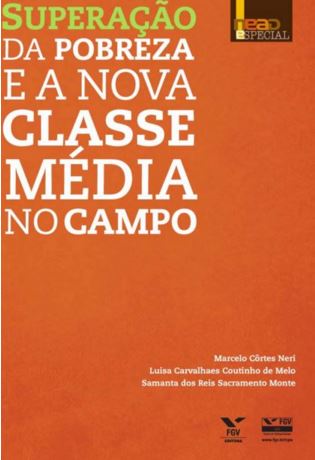
Poverty and the New Rural Middle Class - Marcelo Neri, Luisa Melo e Samanta Monte
Abstract:
The aim of this book is to unveil a new world in the traditional field of poverty studies, here and elsewhere, that is the rural area. If the new Brazilian poverty is on the suburbs and in the slums of large cities, the old poverty remains in the field. There is now a set of emerging groups in old Brazil that need to be identified and studied in their particularities. The Center for Social Policies of Getulio Vargas Foundation (FGV) has been for more than a decade characterized by processing and analyzing in first-hand each microdata harvested, analyzing the distribution of income, in a broadest sense, and poverty indicators. A few years ago, we extended our focus on absolute poverty to other segments of the population. In particular, we followed the evolution of the economic classes E, D, C and AB. Sociologists can relax because we are not talking about social class (proletariat, bourgeoisie, capitalists, etc.), but economic strata. Read "money in the pocket", that it would be, according to economists, the most sensitive part of the human anatomy. New middle class was the name we gave to the class C strata years ago. Call someone “a Class C person” sounded derogatory, worse than class A or B, for example. New middle class gives the positive and prospective sense that they accomplished - and continues to accomplish - the dream to get ahead. It is imperative to combine the instruments of poverty analysis as insufficient income and apply the changes taking place. The option was to align our innovations in the analysis of the methodology in the fruitful literature of poverty measures and social welfare based on household income per capita with its relations with the labor market and education. From that starting point, we have incorporated other key dimensions such as the issues of sustainability and the sensitivity of the people over their own lives. The first case deals with the concrete relations between income flows and the accumulation of assets open on two major fronts: the consumer and the producer. The second enters the literature of subjective perceptions and happiness. So, income-based economic class is just the first step of the methodology used here, providing a useful initial framework to align changes in assets and perceptions of societal segments. In short, in this book we seek to map the path between the old poverty and new middle class in the rural areas, its advances, setbacks, and the challenges facing ahead. In addition, we offer a website that allow each one analyze issues of interest in the field from their own perspective.
"The work of Marcelo Neri is an essential reading to understand the profound social changes occured in Brazil in recent years." Luiz Inácio Lula da Silva
"I would like to suggest to all who are dedicated to the theme of poverty reduction to read the book of Marcelo Neri. He's one of the Brazilians who have been helping Brazil to fight poverty and misery." President Dilma Rouseeff
"Poverty and the New Middle Class in the Field, from Marcelo Neri, brings new light to the intensity of the changes taking place in rural areas." José Graziano da Silva - Director of the Food and Agriculture Organization of the United Nations (FAO)
*Visit the book website
*Access the book slide presentation
Click on the button below to read the executive summary of the book in english:




